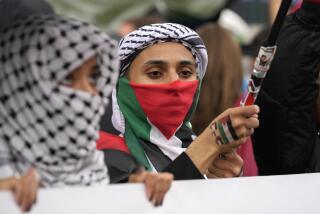Arabs Battle Each Other and Israelis : Occupied areas: Rival factions clash over peace talks in Madrid. In Hebron, a Palestinian is slain by soldiers. Iran condemns the conference.
- Share via
JERUSALEM — As the Middle East peace conference opened in Madrid on Wednesday, Palestinians clashed with one another and with Israeli security forces in the occupied West Bank and Gaza Strip while Iran condemned the U.S.-Soviet sponsored talks as treasonous and threatened participants with “the wrath of nations.”
Israeli soldiers fatally shot a 19-year-old Palestinian in Hebron, and Israeli security forces said about 20 others were wounded by army gunfire in Gaza; 11 other Palestinians were wounded in Nablus.
Authorities said rival Palestinian factions, those supporting and opposing the Madrid talks, fought with chains and knives. About 40 Palestinians were injured in the fighting, Israeli sources said. The combat occurred mainly between supporters of Palestine Liberation Organization Chairman Yasser Arafat, who favors the talks, and adherents of Hamas, a Muslim fundamentalist movement that opposes the peace meeting.
In the Gaza Strip, demonstrators marched in support of Arafat and the talks. They stoned mosques after Hamas and other radical groups had forced shops to close as a protest against the Madrid conference. Four Hamas members were reportedly stabbed by those supporting Arafat and the talks.
Five thousand Arafat sympathizers marched in support of the peace talks in Khan Yunis, also in the Gaza Strip. In West Bank locations, militant Arab youths burned tires, set up roadblocks and stoned army patrols--provoking a sharp response from the security forces.
The Israeli army was on maximum alert throughout the occupied territories, and additional troops patrolled the streets of Jerusalem on Wednesday evening.
In West Bank towns such as Janin and Kalkalyia, Palestinians in favor of the talks forced shopkeepers to open--after the militants had warned all merchants to close Wednesday.
In Israel, three soldiers--a major and two sergeants--who were killed Tuesday in southern Lebanon were buried Wednesday with full military honors.
Israeli Defense Minister Moshe Arens warned that terrorist action only “reinforced” the government’s determination to settle “all parts of the land of Israel.” Arens blamed Iran and Syria for this week’s violence, in which two civilians were also killed by an attack on a bus in the West Bank on Monday night.
And Arens added that the Madrid talks would have no effect on Israeli retaliation against the guerrilla attacks.
Israel is being pressed in Madrid to stop building controversial settlements in the occupied territories and to give up military positions in what it calls a “security zone” in southern Lebanon.
“We’re not going to be held back by anything,” Arens said over Israel Radio.
On Wednesday morning, Israeli gunners shelled suspected positions of the pro-Iranian Hezbollah movement in Lebanon, military sources here said.
U.N. observers reported that at least 260 shells landed in various areas in southern Lebanon. Hezbollah and radical Palestinian groups have promised to sabotage the Madrid peace talks with a stepped up campaign of violence against Israeli targets.
Meantime, Iran’s spiritual leader, the Ayatollah Ali Khamenei, assailed the peace conference in Madrid, continuing an across-the-political-board Iranian assault on the talks.
The ayatollah, spiritual successor to the late Ayatollah Ruhollah Khomeini, delivered his threats against the conference to a group of military graduates, according to a Tehran Radio broadcast monitored in Nicosia, Cyprus.
Khomeini had insisted that opposition to Israel was the No. 1 foreign policy principle of the Islamic republic--even though his regime dealt privately with Israeli arms dealers during the Iran-Iraq War. His political successors have kept up a drumbeat of tough talk against Israel.
A week ago, President Hashemi Rafsanjani declared that his government is prepared to send Iranian troops to fight the Israelis, if necessary to further the Palestinian cause.
And in an interview with the British news agency Reuters published Wednesday, Iranian hard-liner Ali Akbar Mohtashemi blasted the Madrid conference as “a declaration of war on Islam.”
Although he lacks religious standing to issue Muslim death sentences, the former interior minister said: “Based on Islamic sharia (law), all participants in the Madrid conference are considered mohareb (those warring with the Muslim religion), and they must face the death sentence.”
Mohtashemi organized the Lebanese Hezbollah movement in the early 1980s when he was Iran’s ambassador to Syria. Hezbollah Shiite Muslim guerrillas attacked Israeli troops in southern Lebanon repeatedly in the last week.
Tuohy reported from Jerusalem and Williams from Nicosia, Cyprus.
More to Read
Sign up for Essential California
The most important California stories and recommendations in your inbox every morning.
You may occasionally receive promotional content from the Los Angeles Times.













